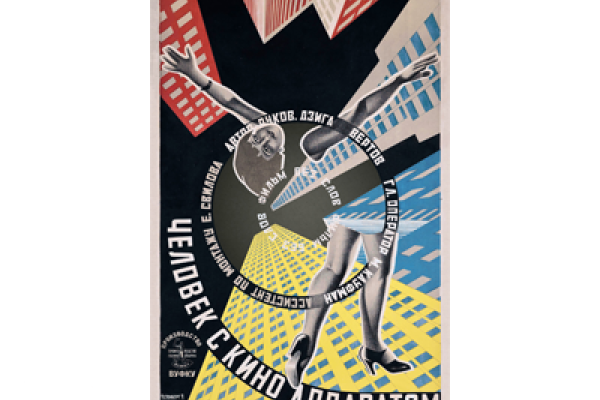
Join CSEEES and the Gateway Film Center for a once in a lifetime screening of Dziga Vertov's Man with a Movie Camera. Set on the streets of Moscow, Kyiv, and Odesa, a cameraman wanders around the city streets with a camera slung over his shoulder, documenting urban life with dazzling invention. Part documentary and part cinematic art, the film depicts everyday life in once-modern cities. The screening will be joined by Austin-based indie chamber music group Montopolis who will score the infinitely inventive Soviet experimental silent documentary.
Students can receive a discount to this once in a lifetime event using the code "CSEEES2022" at checkout or by showing their BuckID at the Gateway's ticket counter.
About the film:
Austin-based indie chamber music group Montopolis scores the infinitely-inventive Soviet experimental silent documentary, Man with a Movie Camera (1929), live in the screening room.
Set on the streets of Moscow, Kyiv, and Odesa, a cameraman wanders around the city streets with a camera slung over his shoulder, documenting urban life with dazzling invention. Part documentary and part cinematic art, the film depicts everyday life in once-modern cities. Composer Justin Sherburn created a joyful original score to be played alongside the film to celebrate the beauty and resilience of Ukraine’s people.
About the filmmaker:
Dziga Vertov was a Soviet pioneer documentary film and newsreel director, as well as a cinema theorist who developed his own cinematic language. His filming practices and kino-glaz (“film-eye”) theory—that the camera is an instrument best used to explore the actual happenings of real life—had an international impact on the development of documentaries and the cinéma vérité style of movie-making. His features include Kinoglaz (1924), The Sixth Part of the World (1926), The Eleventh Year (1928), Man with a Movie Camera (1929), Enthusiasm (1930) and Three Songs of Lenin (1934 and 1938).
For questions, please email cseees@osu.edu.
